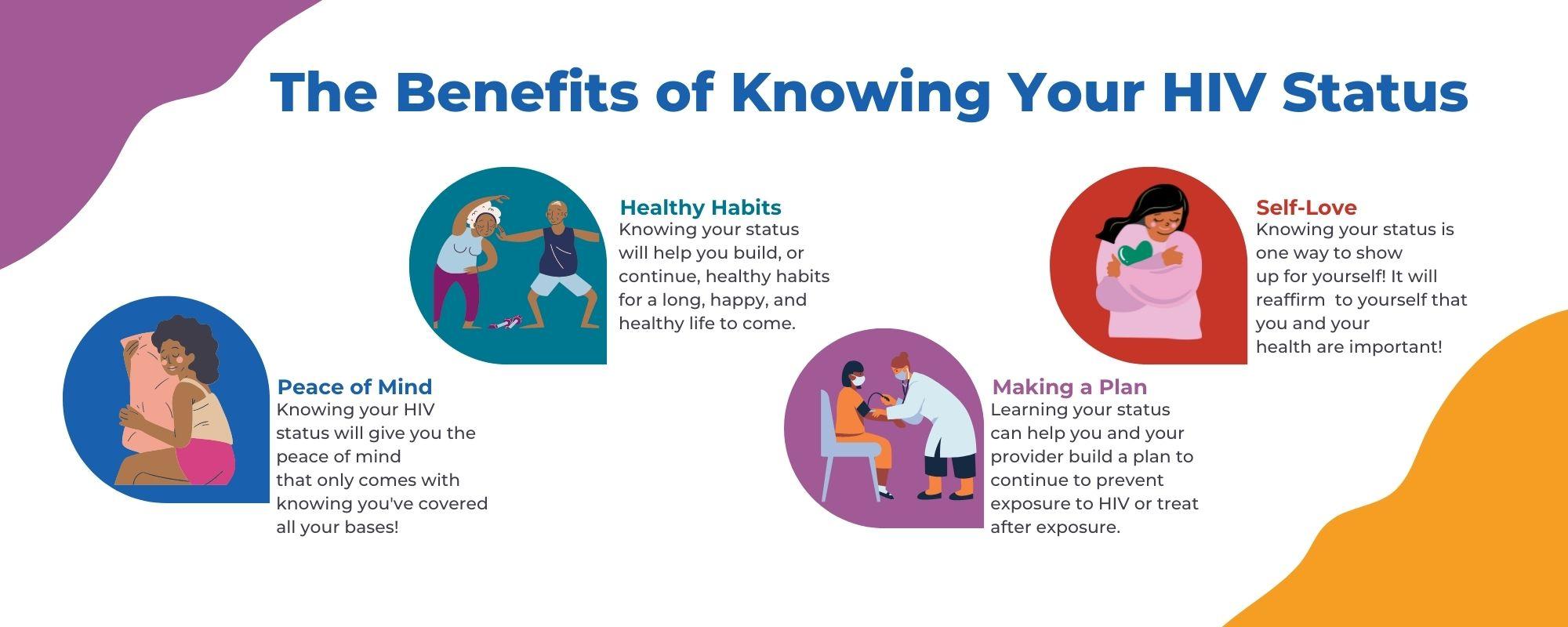Testing: The Positive and Powerful Way to Protect Yourself and Others
If knowledge is power, knowing your HIV status is a superpower! It is the most important tool for prevention and a major show of respect to yourself and others. An HIV test result can provide exactly what you need to know to take the next steps toward protection and prevention or to get prompt and effective treatment. Take advantage of every opportunity to keep yourself and your loved ones safe. Don’t risk regret; make a choice to get tested!
We understand getting testing can be intimidating. The first step is to become well-informed about what to expect and consider all the positives that prevention testing can provide. It will become clear that testing is essential to living a healthier life and also contributing to your role in ending the epidemic. Regardless of your result, you can move forward knowing your health is in your hands and that’s a powerful place for it to be!
Who Should Get Tested
It is recommended that everyone between the ages of 13 and 64 gets tested for HIV at least once per year. However, individuals with certain risk factors should get tested more often. Risk factors are dependent on specific social, behavioral and health circumstances. It’s essential to be aware if you are at risk due to any of those situations.
You should get tested once a year if:
- You are a male and have sexual contact with another male
- You have had anal or vaginal sex with someone with a positive HIV diagnosis
- You have had a new sexual partner since your last HIV test
- You share syringes
- You have exchanged sex for drugs or money
- You have been diagnosed or treated for hepatitis, tuberculosis, or a sexually transmitted infection
When it comes to this list, you should also consider your partner. You should get tested if you have had sexual contact with anyone who has participated in one or more of these activities, because your partner’s social and sexual behaviors affect you. Know their history and encourage them to get tested too!
There are many other reasons to consider getting tested more often than once a year. For example, if you’re a gay or bisexual male, getting tested every 3 to 6 months may be more appropriate.
Here’s why: Male-to-male sexual contact accounted for 69% of all new HIV infections in 2019. This number was calculated across all demographics, making them the most at-risk group in the U.S.
Pregnancy is another situation that should send you seeking a test. Starting HIV treatment early in pregnancy increases its effectiveness and significantly lowers the risk of passing HIV to the baby.
What to Expect
Your experience will be dependent on where you opt to get your test. Methods vary from lab settings, health care facilities, private testing sites and at-home kits. A healthcare provider may ask you some general questions and will likely want to discuss risk factors with you. The flip side is that you can ask any questions as well! It’s a chance to learn more from a healthcare professional.
Depending on the test administered, a blood or oral fluid sample will be collected during your visit. Usually the blood is taken through a simple finger prick, although some forms of testing require blood drawn from a vein. Oral fluid samples are swabbed from the inside of the mouth.
Types of Testing
There are a few types of tests, and the one you get depends on your situation, where you test, and your preference.
- Rapid test-This type of test means you’ll typically wait at the testing location to find your results out that day.
- Lab test-A lab test requires samples to be sent away for analysis which will take a couple of days before you’re notified of the result.
- At-home test-These tests can be used at home in a private location. A health care provider can order an at-home test, or you can purchase one at a drugstore.
What Do These Tests Do?
Essentially, HIV tests look for evidence that your body has been exposed to or is fighting the virus. Some tests look for the actual virus in the blood. Here’s some helpful vocab:
- Antibodies-A part of your immune system that is produced when your body has been exposed to a virus like HIV. The presence of antibodies means that your body is working to fight off a virus.
- Antigens-Foreign substances that cause your immune system to activate. Antigens can be present even before your body has begun to develop antibodies.
HIV tests can look for the presence of HIV antibodies or HIV antigens in your blood or oral fluid. Rapid and at-home tests are most commonly antibody/antigen tests.
Another test, the Nucleic Acid Test or NAT, tests for the presence of the actual virus in the blood. It can also tell how much of the virus is there, known as the viral load. This test is most often for individuals who have had an exposure or are showing symptoms but tested negative for an antibody or antigen test. A counselor or health care provider can offer guidance on which test may be right for you.
Understanding Your Results
A negative test result doesn’t always mean you don’t have the virus. The window period is an important factor in interpreting your results. The window period is the time between exposure and when a test can detect the virus. The window period spans a certain number of days, depending on the type of test you take.
If your first test shows negative, it may be necessary to take another test after the window period. A negative result at that point means you do not have the virus. It’s also important to remember that a negative test for you does not mean that your sexual or needle-sharing partners are negative.
Follow-up testing by a health care provider is necessary if you receive a positive result from an antibody, antigen or at-home test. If the result is positive on the follow-up test, it means that you do have HIV.
Testing positive does NOT mean you have AIDS. AIDS is the most advanced stage of HIV and can result in an individual who neglects to get treatment or care for themselves; however, with the proper care and treatment, a person with HIV can live a long, healthy life without ever developing AIDS.
Sharing Your Results
It’s important to share your status with sexual or needle-sharing partners. It can be an uncomfortable conversation, but it’s one of the most important you can have. Consider getting tested together and then follow steps for prevention together. It’s up to you if you share your status with anyone else. It may take a little getting used to, but talking about your status keeps you and others safe.
Benefits That Can Start With Knowing Status
Although testing is the key to prevention and transmission, consider these general positives of a smart testing regimen.

Making a Plan
Partnering with a health care provider is important in preventing exposure or gaining proper treatment after exposure or a positive diagnosis. Some questions to ask your doctor after receiving a positive diagnosis:
- How can I protect my partners from getting HIV?
- What daily habits should I adopt to help me stay healthy?
- Can I still work out and be active?
- What signs or symptoms should I pay attention to?
- How often do I need to see you?
The right professional can advise you and provide expert guidance on living healthy with HIV.
Healthy Habits
Consider HIV testing as part of a positive health care regimen. If you haven’t already established healthy habits in your lifestyle, it’s never too late to start! You can set yourself on the path toward a future feeling good physically and knowing that you’re doing right by your body.
Other healthy habit tips we should all heed:
- Limit alcohol intake
- Maintain a healthy weight
- Eat a diet of nutrient-dense foods
- Be consistent with prescribed medications
- Stay active
- Avoid smoking
- Get enough sleep
No matter your status or degree of risk, these habits can improve overall health outcomes. Give your body a boost by getting tested and maintaining a healthy lifestyle.
Self Love
Treating yourself to a test is a smart show of self-love. Self-love is the act of accepting yourself fully and making moves toward growth while nurturing your wellbeing. To really understand self-love, think about how you would treat yourself, talk to yourself and feel about yourself in a way that shows love and concern.
Getting tested means you believe you matter.
Peace of Mind
Nothing makes more of an impact on your mental and emotional health than being at peace. Worrying about an exposure or potential risk situation will wear you out and drag you down. That type of negativity can even have an adverse effect on your physical health. Let yourself know you’ve done everything to ensure your health and wellbeing. The perks of enjoying peace of mind:
- Lower stress levels
- Gain confidence
- Project positivity in your relationships
- Regulate emotions
- Get improved quality of sleep
Take the tension out of your situation and choose to test!
Get Connected and Get Tested Today
Get connected with the resources you need to get tested and take the steps today toward putting the power of knowing your status in your hands. We can also help you get answers whether you need basic information about HIV or have a specific question regarding your situation or status.
SIDE by SIDE is committed to helping you get the assistance, knowledge, and support you need.
Help prevent the spread of HIV, protect each other, and end be a part of ending the epidemic. Get tested.





